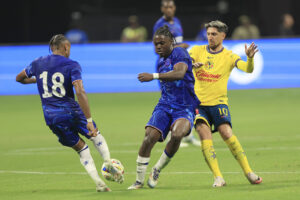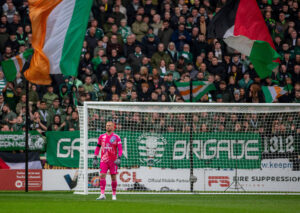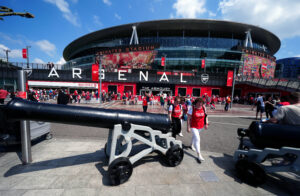Welcome to the latest instalment of Last Word on Football’s Team of the Decade series, this time looking at the best players to feature for Wales during the 2010s.
Wales’ Team of The Decade
The Dragons Flying High
The Welsh came on leaps and bounds throughout the decade, beginning the decade as the 76th best side in the world and ending it in 22nd spot.
The qualification campaign for Euro 2016 resulted in them reaching a high of 8th in the FIFA rankings, becoming the leading British side for the first time in the nation’s history.
Chris Coleman’s men headed to France the following summer and continued to defy expectations – topping their group ahead of England and then making it all the way to the semi-finals.
The decade finished with legend Ryan Giggs at the helm who steered his home nation to qualification for yet another European Championship.
Manager – Chris Coleman
There was no other choice except for the man that provided the Welsh people with their most successful trip to a major tournament of all time.
Coleman took over in 2012 following the sudden and tragic death of his friend Gary Speed, he was at the helm for five years before departing for the northeast to manage Sunderland.
Despite losing the first five of his 50 games in charge, he took Wales to their highest ever FIFA ranking and subsequently their first qualification for a major tournament since 1958.
Formation – 4-3-3
Goalkeeper – Wayne Hennessey
A constant throughout the decade having made his debut back in 2007 during a 2-2 draw with New Zealand.
Hennessey sits third in the most appearances made for the national side with 89 caps to his name.
Despite being benched for Wales’ opening game of Euro 2016, a 2-1 victory over Slovakia, he returned to face England and remained in net for the rest of the tournament.
Right-Back – Chris Gunter
The most-capped Welshman of all time, Gunter was another easy choice, making his debut in the same match as Hennessey aged just 17.
The Reading defender played every minute of Wales’ Euro 2016 campaign and has captained the side on occasion too.
Now aged 30, next summer’s European Championships may be the perfect swan song for Gunter to call time on his international career, most likely reaching a century of appearances for the Dragons in the process.
Centre-Back – Ashley Williams
Captain for most of the decade after taking over from Aaron Ramsey following the arrival of Coleman, Williams is another player that has been part of the furniture in the national team setup.
He began his career in non-league before signing for Swansea City, making over 300 appearances for the south Wales side between 2008 and 2016.
Williams has only scored twice for the national side but his second goal was massive in the country’s history – the equalising goal in the 3-1 quarter-final win over Belgium at Euro 2016.
Centre-Back – James Chester
Despite being out of favour in recent times, Chester came into the national side in 2014 and played his way into the starting line-up for Euro 2016, playing every minute of the tournament.
He didn’t miss a single game as Wales narrowly missed out on World Cup 2018 qualification, keeping countryman James Collins out of the side of much of this time.
Left-Back – Ben Davies
Davies wasn’t always deployed as a full-back by Chris Coleman, often playing more central as part of a defensive five – however for the purpose of this, he’s playing his more natural position.
With over 50 caps to his name since making his debut in 2012, he narrowly beats former Swansea City team-mate Neil Taylor to a spot in the starting XI.
Central Midfielder – Joe Allen
Dubbed the ‘Welsh Xavi’ by former boss Brendan Rodgers, his industrious playing style saw him earn a place at the heart of the Welsh midfield for the majority of the decade.
Allen was named in the Euro 2016 team of the tournament for his performances in France.
He was also one of five players to represent Wales as part of the Team GB football team at the London 2012 Olympics.
Central Midfielder – Joe Ledley
What. A. Beard.
He’s been through the highs and lows of the Welsh national side since debuting in 2005 and earned 77 caps along the way – making him the seventh most capped Welshman.
Attacking Midfielder – Aaron Ramsey
One of the most successful players in this side, Ramsey made his debut in 2008 and went on to pick up the Welsh FA’s young player of the year award in both 2009 and 2010.
He captained the side under Gary Speed and is joint-seventh in terms of goals scored for Wales with 16 from 60 appearances.
At Euro 2016, Ramsey was the top assister and named alongside Joe Allen in the team of the tournament, joining names such as Toni Kroos, Cristiano Ronaldo and Antoine Griezmann on the list.
Winger – Hal Robson-Kanu
Admittedly, Robson-Kanu has predominantly featured up top for the Welsh but his Euro 2016 heroics meant that he had to be squeezed into this side some way or another.
Coming on as a substitute in the opening game against Slovakia, he scored the winner nine minutes from time.
However, it’s all about that Cruyff turn. Taking three players out of the game to put his side ahead in a European Championship quarter-final.
Striker – Sam Vokes
With 64 caps to his name and 11 goals to boot, Vokes has been an influential player within the Welsh side in the last decade, albeit somewhat overshadowed by the likes of Bale and Ramsey.
He saw off the Belgians with a goal that embodied his playing style, holding off his man to head home and send the Welsh supporters into delirium.
Winger – Gareth Bale
Last but not least. The icon for Welsh sport. Spearheading Wales’ surge up the world rankings to become a serious threat on the international stage during the 2010s.
The sixth-highest appearance maker for the Dragons with 83 caps and all-time leading goalscorer having netted 33 times.
It’s fair to say that Gareth Bale has given Welsh football an audience much greater than just the borders of Cymru.
Subs: Boaz Myhill, James Collins, Neil Taylor, Andy King, David Edwards, Tom Lawrence, Simon Church.
Main Photo
Embed from Getty Images






